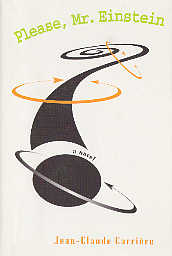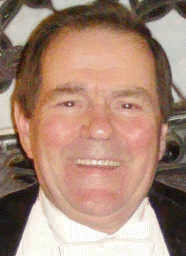We seem to need a way to understand the incomprehensible, but Einstein tells us that is futile. "As
if," he begins derisively, "the stars were hung in the sky to answer our long-standing questions." He
gives us the mantra of the materialistic scientist, which if we hum it long enough, will convince us that the
stars which are unreachable during our daytime being must likewise be unreachable to our nighttime
being, which seems to me to be the abderian route to absurdity. And, yet, he admits to experiencing
feelings feelings which are the scant daytime bleed-through of our nighttime perception of the
spiritual world in which the stars are our intimate companions. But, Einstein avers, he doesn't believe in
God.
[page 85, 86, italics added] "Certainly not. In the light of this boundless
magnificence, the notion of a divine creator and ferocious chastiser of the only
human race strikes me as wholly absurd. Why should such a genius, who
encompasses all things in a cosmic dream of unattainable dimensions, pore
over our tiny peccadilloes like some persnickety schoolmaster? Besides, as
you're doubtless aware, to a scientist all our actions are predetermined, or
nearly all. Our free will is extremely limited.
I would say rather, to a dummkopf all human actions are predetermined. To use one's thought to
probe the universe and to explain only the physical aspects of the universe all the while ignoring thought
itself is a true abderian fiasco. But the physical aspects of the universe are explained and accepted by
the dark equations of the members of the club, whose clubhouse entrance is topped by the warning,
"Abandon All Free Will Before Entering."
Rightly understood, science pours the material world into the realm of spirit by formulating its laws,
while art pours the realm of the spirit into the material world by creating its works of art(1). To me that is
a far better way of understanding science and art than what the girl says in this next passage.
[page 106] "But the arts obscure the mysterious," she says, "whereas the
sciences seem to make it their mission to dispel it."
The girl's Einstein disagrees, but only throws more confusion into the mix of obfuscation which at
times chunks up in this novel around the ideas of Einstein.
[page 107] Einstein disagrees. It's true, he says, that the arts tend to seek
obscurity that's what they're there for but they can also arrive at
resounding truths that are personally experienced and felt by a very large
number of people, whereas scientists are forever roaming from one mystery to
another. And, when they think they've discovered some kind of new light, they
don't know how to make it acknowledge that discovery. Darkness resists, digs
its heels in, builds itself new lairs. Hence the liking scientists cherish for the
inexplicable, and hence their attraction to the unknown. (A perverted taste?
Who knows?) It's as if vast territories of a potentially hostile, lethal nature
have only been awaiting their arrival to reveal themselves ever since the world
began.
The next passage contains a wonderful reference to the disappearance of magic contained in
Shakespeare's final work. This metaphor presages the move of science from alchemy to chemistry
which was accompanied by human beings turning their view from the spiritual realities to the hard
physical realities.
[page 107] And to think that there are still some who feel a nostalgia for magic,
for the great, encoded secret preserved by initiates, for signs that conceal
things, for symbols and numbers! They have forgotten that in The Tempest, at
Shakespeare's behest, Prospero consigns his magic book to the ocean bed
forevermore. His charms and spells are "O'erthrown," tossed overboard. He
abandons them and goes home. A huge page turned at the beginning of the
seventeenth century. Copernicus was dead and Galileo hard at work, Descartes
had already been born. A brave new world was in the offing. Elves and goblins
were disappearing who knows where, fairies were in hiding. The last witches
were being burned at the stake by frenzied fanatics.
Soon, the everyday experience of elves and fairies disappeared from adult eyes, remaining only in
the eyes of the newborn until they reached about three years old. What remained were the dregs of the
coffee whose aromas filled the nostrils of humans for ages. Scientists today claim that the humans who
smelled the aromas and saw directly such visions of the spiritual world as elves and fairies were
hallucinating.
Einstein at one point in the novel refers to himself as a "model" because at every place he went to
speak, he was photographed. Once he stuck his tongue in disdain for the photographer with the camera
and that became one of his most famous images, as though he did it often instead of only once. When
the renown scientist Arthur Eddington confirmed Einstein's prediction of the curvature of space in
1919, curiously it was the golf correspondent for the New York Times which reported the scientific
breakthrough.
[page 134] He is photographed on each of this public outings, so much so that
he once declared that his true profession was that of a photographer's model.
In 1948, on emerging from the hospital after a brief admission for surgery, he
sticks out his tongue at one of the photographers who are pestering him, and
this impish image remains a twentieth-century icon, even today.
When people suggested that his theories could produce a bomb that could destroy the world,
Einstein thought it was idiotic and impossible.
[page 136] "I didn't believe that one of my equations could unleash the
Apocalypse. They hadn't been conceived with that in mind, of course. They
were research, pure and simple."
When his fellow scientists came to plead with him to write the letter to President Roosevelt
suggesting a way to end World War II, Einstein was taken aback. How could he suggest such a thing
be created from his own ideas?
[page 138, 139] "I was in an exceptionally dramatic position. Can you imagine?
There was a possibility that the fate of the planet was being decided in this little
seaside house, which a doctor friend had lent me. We knew that the fission of
uranium had been achieved and that several teams were on the way to
producing a chain reaction."
Back then, no one imagined the atomic bomb could be made small enough to be carried on an
airplane, so it was thought that only port cities were endangered by a large ship carrying the bomb into
a harbor. That was what he wrote in the short letter to Roosevelt which he signed on August 2, 1939.
When the bomb was finally used for the first time, on Japan instead of Germany, he listened to the event
on the radio like everyone else. He reportedly called it a "calamity." (Page 152)
But his biggest calamity was the thought experiment he teamed up with two graduate students,
Poldosky and Rosen, to show that quantum mechanics had a fatal flaw, a paradox, which their thought
experiment revealed. The girl wants to know about the EPR Paradox.
[page 168] The girl now alludes to the old EPR paradox to which Einstein lent
his initial (the others being those of Poldosky and Rosen), the crucial more
recent experiment conducted by the physicist Aspect and the research
carried out by other experts of whom she has heard. What about these particles
that receive information instantaneously, wherever they happen to be in the
universe, as if space and time had no hold over them. As if they ignored and
dominated them or constituted them? and as if non-localized influences faster
than light were at work? What about them?
The unthinkable has been proved possible! And necessary! It revealed Einstein's biggest difficulty
he had to give up thinking. Perhaps that T-shirt with his tongue sticking out is the crux of his message
to the world in which he found unthinkable things happening.
[page 169] I can't bring myself to admit defeat and say: Beyond a certain point
the world is genuinely inexplicable, prodigiously incoherent and fundamentally
paradoxical, and I will never know how or why. I will never be able to say that.
You asked me the question on arrival, remember? You asked me to explain,
and I told you that explaining is the hardest thing in the world. Now do you see
why? Because I'd have to explain that we must give up explaining. And I never
would! It would mean going against all that made up my life. Was I lionized,
feted, decorated, celebrated, showered with awards and praised to the skies,
only to take my leave, sticking out my tongue for the last time and saying:
Ladies and gentlemen, I've been no earthly use, I've floundered around in
ignorance, I don't know what to say to you and I'm making for the exit bereft of
ideas?"
The girl, whose name is never revealed in the novel, leaves us with a delightful metaphor which I
call the Puddle's Kern(2), a deep element of truth about the minds of some people.
[page 171] Just for fun, the girl speaks of a puddle formed in a potholed road
after a shower of rain. Suddenly endowed with reason, the puddle explores the
ground around it and cries, "What a miraculous coincidence! My shape and
dimensions exactly match those of this hole in the road! That means I was
meant to be at this particular road! There's no doubt about it, so what other
purpose could I serve?"
Some minds, she says, are shaped like puddles.
Einstein's mind was not such a mind, it did not fit into the puddle of science or even into the puddle
we call the universe. He managed to extract some meaning from the world that no one else ever
imagined and the result was, as he saw it, a cataclysm. Instead of a puddle, perhaps the world is a
muddle. "It's an everlasting muddle. The world is our muddle. And yet, whatever the object of our
work, it's always the world of which we're thinking. It's all we have." As the girl leaves, he waves to
her, and picks up his violin to play it. Will he perhaps play Schoenberg for the first time?
![Click to return to ARJ Page, File Photo of Jean-Claude Carrière Cover Jacket DRFP Odile Jacob]](http://www.doyletics.com/arj/pleasaut.jpg)




